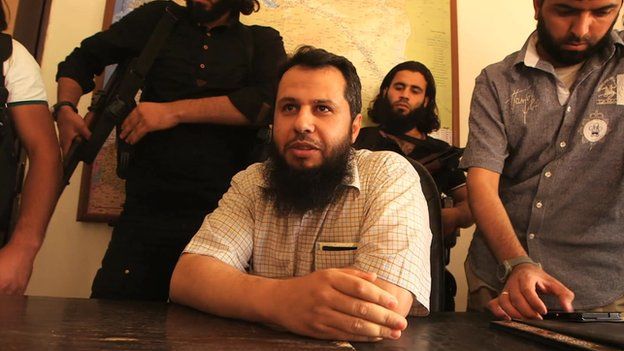Syria conflict: Blast kills leader of Ahrar al-Sham rebels
- Published

The leader of one of the biggest Islamist rebel groups in Syria has been killed by an explosion in the north-western province of Idlib.
Ahrar al-Sham said Hassan Abboud was among a number of senior figures who died in the blast at the group's headquarters in the town of Ram Hamdan.
There were conflicting reports about the cause of the blast and it was also unclear who was responsible.
Islamic State was accused of killing an Ahrar al-Sham leader earlier this year.
The jihadist group has been battling rebel groups for control of northern and eastern Syria since January, when they launched a co-ordinated offensive to expel it from the country.
Thousands of people have been killed in the infighting, which President Bashar al-Assad's forces have exploited.
'Gas attack'
The explosion targeted a meeting of as many as 50 Ahrar al-Sham leaders in a basement at the group's heavily fortified headquarters.
The Islamic Front, a rebel umbrella group in which Ahrar al-Sham was the strongest faction, said that Abboud was among at least a dozen senior figures killed.
The UK-based Syrian Observatory for Human Rights - an activist group monitoring the conflict in Syria - put the death toll at 28.
The cause of the blast was not immediately clear. Ahrar al-Sham said there had been a car bombing, while opposition activists initially reported that a suicide bomber had blown himself up at the meeting. Some have described the incident as a "gas attack".
Abu Baraa, a member of a rebel group allied to Ahrar al-Sham, told the Reuters news agency that a doctor who had examined the bodies said there was little visible sign of external injuries.
The doctor saw bodies with frothing at the mouth and fluid coming from the eyes and noses, Abu Baraa said, adding: "This was a highly sophisticated attack in a location that was very secure."
On Wednesday morning, Ahrar al-Sham announced that Hashem al-Sheikh, known as Abu Jaber, would succeed Abboud as leader, while Abu Saleh Tahhan would be its new military chief.
"A group of the best leaders of Ahrar al-Sham have been martyred. But Ahrar al-Sham is more determined than ever to continue on the path to liberating our country from dictators," a video statement said.
Islamic rule
The Islamic State (IS) militant group is the most likely quarter to be blamed for the attack, reports the BBC's Jim Muir.
It was accused of being behind a suicide bombing that killed another Ahrar al-Sham leader - Abu Khaled al-Suri, a veteran al-Qaeda operative - at his headquarters in Aleppo in February. However, IS subsequently denied any involvement.
Ahrar al-Sham is part of the Islamic Front, a coalition of seven Islamist rebel groups.
Abboud, who was also known as Abu Abdullah al-Hamawi, was imprisoned by the Syrian authorities after taking part in the insurgency in Iraq but released in early 2011 as part of an amnesty.
He helped found Ahrar al-Sham (Free Men of the Levant) in Idlib province in late 2011 and in December 2012 formed the Syrian Islamic Front (SIF) with 10 other hardline Islamist groups.
Before its dissolution in November 2013, when the creation of the Islamic Front was announced, SIF had become the most powerful rebel force.
The Islamic Front refuses to come under the umbrella of the Western-backed Supreme Military Council (SMC) of the Free Syrian Army, but co-operates with SMC-aligned brigades on the battlefield, as well as the al-Nusra Front, al-Qaeda's affiliate in Syria.
Our correspondent says the death of Abboud comes at a moment when the US government is seeking to unify the Syrian opposition into a co-ordinated fighting force against IS, although Ahrar al-Sham would have made an unlikely partner in such an American-led campaign.
Its goal is to establish Islamic rule, not democracy, in Syria.